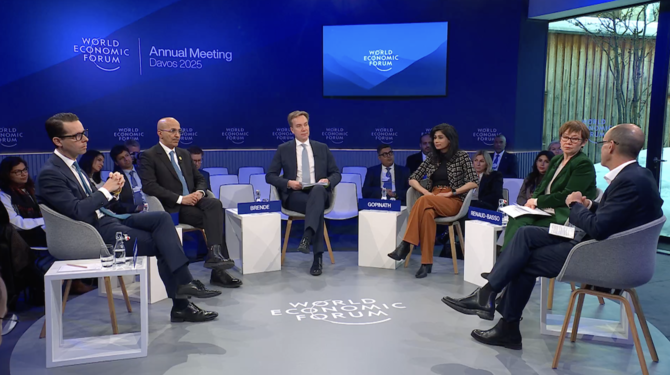DUBAI: A holistic approach is needed to build resilience and sustainable growth in emerging-market economies, through structural reforms, technological investment, and private sector engagement.
This was the consensus of panelists during a discussion on Wednesday at the World Economic Forum in Davos.
The panelists noted that emerging-market economies have managed recent global shocks such as rising interest rates, the COVID-19 pandemic, and increased energy prices, due to long-term investments in macroeconomic stability.
However, Gita Gopinath, first deputy MD of the International Monetary Fund, warned that per capita gross domestic product growth has slowed since the pandemic.
She emphasized that further structural reforms are needed to boost productivity and private sector investment. “Emerging markets need to reinvest in reforms that deepen capital markets, encourage innovation, and enhance human capital.”
She noted that countries including Saudi Arabia and Mexico are exceptions, having maintained growth despite global slowdowns.
Gopinath also pointed to artificial intelligence as a potential driver of productivity but highlighted a significant digital divide.
While advanced economies face 60 percent job exposure to AI, low-income countries remain far behind, with only 26 percent. She said that emerging markets need to invest in digital infrastructure and education to harness the full potential of AI.
Global debt levels are also of major concern. Public sector debt globally now stands at $100 trillion and is projected to reach 100 percent of global GDP by 2030.
Gopinath warned that debt levels are often underestimated, potentially creating a “serious issue” for countries to address in the coming years.
The solution, she said, lies in attracting private sector investment. For example, climate finance will require 80 to 90 percent of funding from private investors.
Governments must create policies that de-risk investments and encourage private capital to flow into critical areas including climate adaptation and digital transformation, said Gopinath.
Saudi Arabia’s Finance Minister Mohammed Al-Jadaan said the country’s Vision 2030 has laid the foundation for structural reforms.
Through initiatives including the Expenditure and Project Efficiency Authority, the country has significantly improved government spending efficiency and attracted increasing private sector investments, he said.
Al-Jadaan emphasized that resilience-building initiatives may not yield immediate returns but prove their value in times of crisis.
Saudi Arabia’s strong recovery during the COVID-19 pandemic can be attributed to the country’s long-term planning and alignment between government and the private sector, he said.
Odile Francoise Renaud-Basso, president of the European Bank for Reconstruction and Development, said Multilateral Development Banks play a key role in supporting resilience in emerging markets.
She said MDBs help countries develop effective macroeconomic frameworks and create environments that attract private investment.
However, Renaud-Basso said that MDBs cannot substitute for private capital but can help foster investment-friendly policies by improving regulatory frameworks, strengthening the rule of law, and simplifying processes.






















